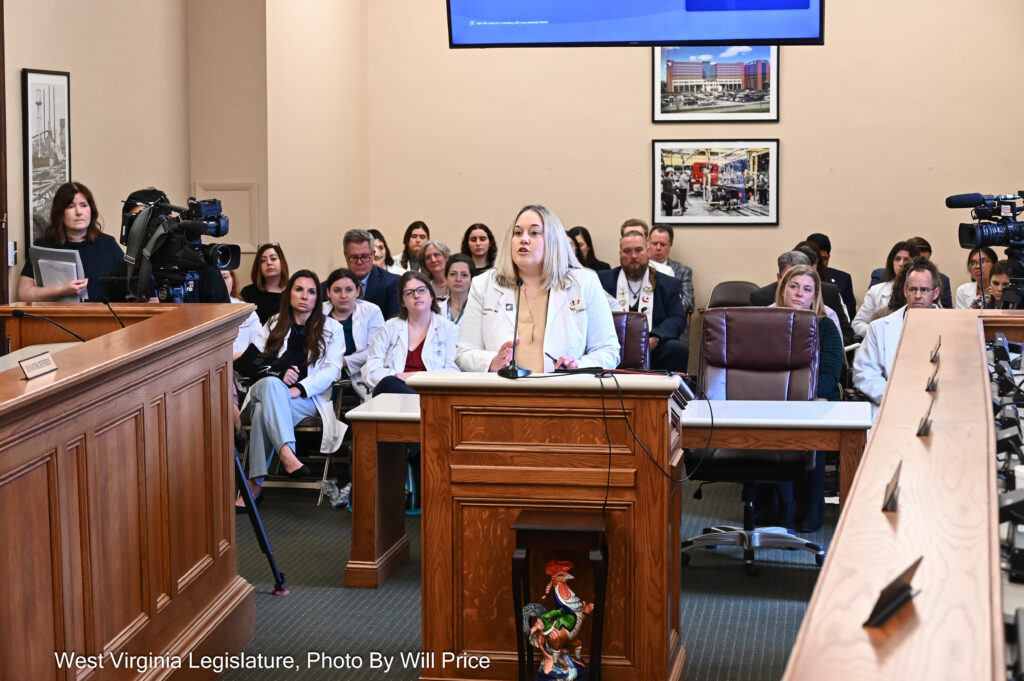A House Bill that aims to change vaccine requirements for virtual public, private and parochial students in West Virginia moved through the Senate Health Committee Wednesday afternoon after a lengthy discussion.
In front of a room full of white-coat-wearing physicians, senators discussed House Bill 5105 – a bill to eliminate vaccine requirements for public virtual schools, unless they participate in a West Virginia sanctioned athletics program.
As it arrived from the House, the bill allowed for religious exemptions to vaccine requirements. A parent or guardian would present a letter stating that the child cannot be vaccinated for religious reasons.
A strike and insert amendment ultimately passed after discussion narrowed those religious exemptions to private and parochial schools.
With a leave of committee, members heard from physicians, a pharmacist and an academic, all with differing views on the issue.
Dr. Lisa Costello, a pediatric hospitalist at WVU Medicine Children’s in Morgantown and past president of the West Virginia State Medical Association, asked the committee to vote against the bill and maintain West Virginia’s current law that only allows for medical exemptions to vaccination.
“With immunizations, the decision that one person makes really impacts all of the other people around us,” Costello said. “We know that there are people who cannot have immunizations, and that’s why our policy as currently is law in West Virginia is the gold standard across the country and that we only allow medical exemptions as a condition for school entry.”
Alvin Moss, a professor at the West Virginia University School of Medicine and a member of West Virginians for Health Freedom, argued that vaccine mandates invalidate informed consent. Moss also testified that his family and friends were injured by vaccines.
“A mandatory policy goes against the whole idea of informed consent,” Moss said. “So our current compulsory vaccination policy doesn’t allow informed consent, and if there were informed consent, then parents should be informed. I know, they receive vaccine information statements when they go to the pediatrician’s office, but they have been watered down over the last decade and don’t truly get into all the information that could be available if parents really knew where to look.”
Sen. Rolland Roberts, R-Raleigh, asked Chanda Adkins, a pharmacist, former delegate and member of West Virginians for Health Freedom, to testify before the committee.
“The conviction to vaccinate or to not vaccinate is a real thing,” Adkins said. “And so there are families out there saying, well, we choose private school, because we have a conviction for that type of education. I want to educate my children in light of God’s word because God’s word is going to be the foundation for my life and there are a lot of people watching today that are going to say, ‘we’re going to honor that.’ Because no government role is going to change. There’s going to be people that are not going to vaccinate their children because they’re living their conviction.”
The final person to testify before the Senate Health Committee was Dr. Steven Eschenaur, the health officer for the Kanawha Charleston Health Department.
“I had a lot of opportunity to spend time in Africa, Asia, the Middle East, and probably unlike most people here, I’ve actually seen all of these diseases, including polio in children in Afghanistan, where it’s still endemic,” Eschenaur said. “As a matter of what is best for the many, we know based upon what our predecessors, those who sat in these seats many years ago, when they enacted these laws.”
Sen. Tom Takubo, R- Kanawha, asked Eschenaur about how vaccines work and what might be misconstrued as an adverse reaction to a vaccine.
“So is it true that when you get a vaccine it is essentially tricking your immune system as if it thinks it’s been infected by that pathogen, and so therefore, you may get some of the signs and symptoms of the disease,” Takubo asked.
“That’s how all these vaccines work,” Eschenaur answered. “They introduce an antigen that’s like the disease but not the disease. It’s either a weakened form or a dead form. So that the human body then says, ‘Oh, I want to build an antibody.’ And those antibodies have what has been what has protected our communities for many, many years.”
The committee passed the bill after amending it to remove religious exemptions for public school students, but not for private and parochial school students.
Appalachia Health News is a project of West Virginia Public Broadcasting with support from Marshall Health.




















